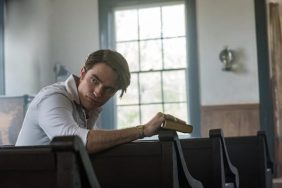Stephen Frears, aged 75, has been directing films for almost 50 years, and over the course of that time has given the world some of the respectable dramas ever produced. And yet, outside of certain cinema circles, many audience members may not know his name. Perhaps that’s because his films don’t usually make enormous amounts of money, but it probably has more to do with the fact that Stephen Frears tends to disappear into his movies, and let them speak for themselves.
Twice nominated for an Academy Award, the impressive career of Stephen Frears continues with this week’s new release Florence Foster Jenkins, starring Meryl Streep as a woman who has no idea she’s one of the worst singers in the world. And while it doesn’t seem to be the best movie Stephen Frears ever made, that just begs the question… what is?
This week on The Best Movie Ever, we’ve asked our panel of film critics – Crave’s William Bibbiani and Witney Seibold, and Collider’s Brian Formo – to present their individual picks for Stephen Frear’s best movie, ever, and as usual they can’t agree on a thing.
Find out what great movies they picked and come back next Wednesday for another highly debatable installment of The Best Movie Ever!
Brian Formo’s Pick: Dangerous Liaisons (1988)

Warner Bros.
Stephen Frears is one of the most reliable director for hires in the business. I call him a director-for-hire because although he’s made a number of quality films (The Hit, My Beautiful Laundrette, The Grifters, High Fidelity, The Queen, Philomena among them), he doesn’t have a distinct style or voice that lends itself to an auteur theory unpacking of common themes. He’s a capable filmmaker and he works regularly, getting solid performances from his cast. There’s nothing wrong with that, but I sometimes get him confused with almost every other British director. My personal favorite film that Frears directed is Dangerous Liaisons.
Dangerous Liaisons is bawdy, with a robust cast, and Frears directs that robust cast to delight in all the verbal sexual deviancies that are never present in period films. Frears (and playwright Christopher Hampton) unbuckle the stuffy period piece, which had become even more lush and dignified as Merchant Ivory was handsomely building their film cache, and reveal the supple skin underneath. John Malkovich might seem like an odd choice for a Lothario but he’s so good with serpentine dialogue he does prove to be very seductive. Glenn Close is conniving, Michelle Pfeiffer is sorrowful, Uma Thurman blushes and Keanu Reeves swashbuckles. It’s all dandy fun as the elites prove that their hearts are every bit as corrupt as the games that they play with the soft virgin maidens these stories prefer (Close and Malkovich’s characters barter on whether or not he can bed specific women who are betrothed to others, so that he can leave them damaged goods and unmarriable. Ha!).
What makes Liaisons so much fun is that it never goes over the edge. There is still a classical comeuppance for the most evil character and lessons are learned about love for the deceiver. Liaisons gets nasty, but it doesn’t revel in it. It still plays by the stuffy rules even though it goes rogue and into multiple bedrooms. With his direction, Frears shoots great performances performing a great script. What else could you hope for from a director-for-hire?
William Bibbiani’s Pick: Dirty Pretty Things (2002)

Miramax Films
Stephen Frears is a remarkable talent who never seems to call attention to himself. There’s an assuredness to his work that many other, more celebrated directors never achieve. A lot of trendy auteurs seem eager to attract attention to their bravura showmanship but Frears simply shows us what’s happening in his stories, and he has fantastic taste in stories.
Case in point: Dirty Pretty Things, a film that’s half-social message drama, half disturbing crime thriller, and seemingly all natural. Chiwetel Ejiofor plays an illegal immigrant who, in his native Nigeria, was a doctor. Now he holds down two jobs as a cab driver and a hotel desk clerk, plying his original trade to fellow immigrants who cannot afford real medical care, and sharing a small apartment with a Turkish Muslim woman (Audrey Tautau), also an illegal immigrant, whose religion forbids them from being alone in a room together. And then he finds a human heart in a toilet, and the plot unfolds.
Dirty Pretty Things captures a world within a world, a society that lives in fear and isolation, parallel to our own. It is a powerful drama about living as an illegal immigrant, marginalized by your nature, and deserving better treatment by virtue of your existence as a human being. But then there’s that human heart, and that disgusting criminal conspiracy, and the whopper of an ending; it’s a ripping great crime yarn with a lot of serious issues to explore in the process, like many of the best crime yarns ever told.
And director Stephen Frears must have put a lot of effort into making Dirty Pretty Things unfold in such a way, one that could only (ironically) be described as “effortless.” It’s an organically thrilling drama, with great performances, that doesn’t call attention to its own greatness. All it has to be is great.
Witney Seibold’s Pick: The Queen (2006)

Pathé Pictures
Stephen Frears is difficult to pin down. If there was a term I could use to describe his style, it’s that of enthused realism. He wants to bring a down-to-earth and straightforwardness to filmmaking that eschews traditional American melodrama, but stays out of the dirty kitchen sink reality of his contemporary Mike Leigh (who is only two years his junior). Frears looks at stories, and – in the most practical, pragmatic fashion – turns it into a cracking movie. That’s it. When he tries something arch or fantastical (and I’m thinking specifically of his failed Dr. Jekyll and Mr. Hyde film Mary Reilly) it doesn’t quite work. But when he’s looking at a marginalized gay community (My Beautiful Laundrette), dejected audiophiles (High Fidelity), the immigrant experience (Dirty Pretty Things), or dotty Catholic ladies (Philomena) he manages to make their “outsider” stories seem like the most natural thing in the world.
His greatest feat, I would perhaps argue, is how he took the best-known and most powerful monarch in the entire world – Queen Elizabeth II – and turned her story into that of an outsider longing for continued recognition. 2006’s The Queen is about the royal family’s – and the world’s – reaction to the 1997 death of the former Princess Diana. The public was crushed, as Di was a beloved and glamorous icon of the people, and was seen as boldly heroic for divorcing a prince. The royals, meanwhile, were ambivalent about Di, feeling that she didn’t carry the class and the clout of a proper royal.
But, more than that, The Queen is a timely film about England’s own ambivalence toward the monarchy. For several decades, England has begun openly questioning and rejecting the need for a royalty at all, preferring an elected governing body rather than what many consider to be a money-absorbing figurehead mascot. The Queen is about how the monarchy deals with that ambivalence, and what they may need to do to survive – if they’re going to survive at all. Frears may have his opinions on the matter, but his film doesn’t offer easy answers. Like all Frears films, it’s refreshingly straightforward, letting the drama of the characters live more forcefully than the attendant politics.








